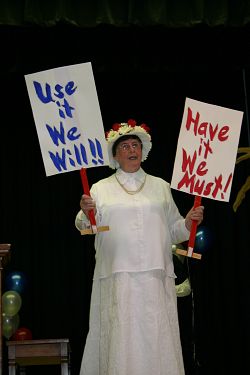Women are encouraged to vote by suffragettes

SALT LAKE CITY — To the tune of "Happy Days are Here Again," the suffragettes sang "Voting day will soon be here. Our cries were heard throughout the years. On election day don’t you sit still. We have the vote, use it we will." The suffragettes were played by various performers in the skit "We’ve Come a Long Way," written by Joan Erbin at the CHRISTUS Saint Joseph Villa Volunteer luncheon held in the Saint Ann Recreation Center Nov. 1. The luncheon was held to raise funds for the residents. "This is the only fund raiser we have all year," said Joan Mirka, CHRISTA Saint Joseph Villa Volunteer president. "We use the funds to buy Mother’s and Father’s Day gifts, and for the residents’ weekly games. It also provides funds for the residents’ birthday parties and art and craft supplies. We will be celebrating the 50th anniversary of our organization next May. Mirka said the volunteers run the gift shop, make visits to the residents, decorate the lunchroom, and most important, visit with the residents. As for the skit, Mirka said playing Elizabeth Cady Stanton, "I’m not the one who had the fame. To England I went to further the cause, but we came back home without applause. "I’m sure you ladies have heard of me. For women’s rights my voice did wail," said Ginger Moulton, CHRISTUS Saint Joseph Villa director of development, as Susan B. Anthony. "At one time, I ended up in jail." "I too fought the battle," said Julia Ward Howe, played by Sister of Charity of the Incarnate Word Margaret Collins. "If you don’t vote, some one will tattle. We want you ladies to please take note, 71 years it took to win the vote." Stanton really began the entire suffrage movement. She went to England in 1840 to attend a World Anti-Slavery Meeting, while on her honeymoon. She married a young abolitionist who traveled all over the country giving anti-slavery talks. She attended the meeting, but was not allowed to speak or vote. After Stanton’s children were grown, she and Anthony traveled around the country for their cause. They even came to Utah at the invitation of some Mormon women, who mostly asked questions about divorce. Stanton used to play in her father’s law office and listen to him talk to woman who came to him for advice. He was usually unable to help them because of all the laws favoring men. Lucretia Mott, played by Jean Prather, and Stanton worked for years on ways to obtain equal rights and voting rights for women. One day while sitting over tea, they decided to call a public meeting, a convention in Seneca Falls, N.Y. It was the first of its kind. They put ads in the newspaper, passed out flyers, and gave talks on street corners. On the morning of July 19, 1848, a huge crowd of all kinds of women and some men came to the convention. They gathered outside Wesleyan Chapel. Stanton wrote a Declaration of Independence for Women, which she patterned after the United States Declaration of Independence. In it she listed the right to seek and keep money women earned, to go to college, to own property, and the right to vote. Everyone at the convention signed the declaration. But the next day, some men made their wives and daughters remove their names from the declaration. They closed the convention with the motto, "Have it we must, Use it we will!" "I published a woman’s newspaper, "The Lily," said Amelia Bloomer, played by Sister of the Incarnate Word Stephen Guiry. I wrote most of the articles. Someone sent in a whole pattern for Turkish pants for women to wear under a shortened skirt, to be printed in the newspaper. I called them bloomers. Women were not allowed to wear bloomers until the bicycle was invented. They could only wear them while they were riding the bicycle, and then they and to change back into a dress." Most men opposed the suffrage movement, and declared women’s brains were unequal to men. As a result of the opposition, many women went to jail. Alice Paul, played by Sister of Charity of the Incarnate Word Ignatia Driscoll, was brought up a Quaker like Mott. Quaker women were viewed as equal to men. "But I saw a need for change," said Paul. "I organized a women’s march of peaceful protesters down Pennsylvania Avenue. We were all dressed in long white gowns with pretty flowered hats. We carried big signs asking for the right to vote. We were attacked with stones and the police refused to protect us. By the time the U.S. Calvary arrived to restore order, many were injured. They decided to teach us a lesson and put us in jail. They hit our heads against the walls, shoved us, and threw us to the floor. It was called "The Night of Terror – 1917." "But one of the women who came to the first convention in Seneca Falls in 1848, was still alive in August 1920, when the United States Congress passed into law the 19th Amendment to the Constitution giving American women the right to vote. Her name was Charlotte Woodward, and she was 91. We finally did it. So women, pledge to vote."
© Copyright 2024 The Diocese of Salt Lake City. All rights reserved.

Stay Connected With Us